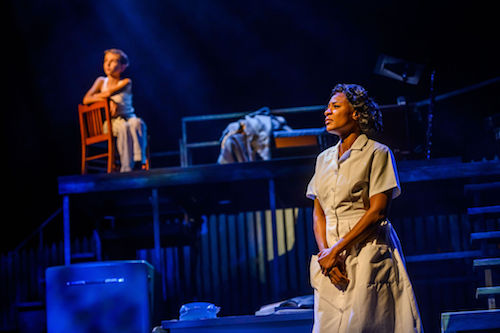
I’ve always thought that Caroline or Change was a brilliant show, unfairly overlooked.
When I saw the original Broadway production in 2003, I was deeply moved by Tony Kushner’s eloquent lyrics and Jeanine Tesori’s multifaceted mélange of a score. Stuck between the pop powerhouse Wicked and the ironic underdog Avenue Q that year, it won a single Tony for supporting actress, and isn’t as well-known as those brighter, brassier shows.
Thankfully, the Musical Stage Company and Obsidian Theatre’s stunning, riveting remount of their hit 2012 production, directed by Robert McQueen, brings it back into the limelight at the Winter Garden Theatre for a well-deserved ovation. If you haven’t seen it, that should change.
The central, semi-autobiographical conflict is a deeply personal microcosm of race and class issues. Set in 1963 in Louisiana, it lies at the heart of the civil rights movement and the increasing explosion of tensions created by those unwilling to, well, change.
Eight-year-old Noah (Evan LeFeuvre) and his clarinetist father Stuart (Damien Atkins) are still grieving the death of Noah’s mother. Their grief and distance have not lessened with Stuart’s marriage to his late wife’s friend Rose (Deborah Hay), who is settling uneasily into the role of stepmother.
Rose’s desperation to be liked meets a steel wall in Caroline (Jully Black), the family’s maid. Caroline is Black, a single parent to four children, and toils for a family not her own. Unwilling to coddle the middle-class Jewish family’s white guilt, and emotionally guarded, Caroline is widely perceived as bitter and unsympathetic.
Rose fixates on to Noah’s tendency to leave small change in his pockets, putting the onus of Caroline to enforce the punishment by keeping what she finds. Uneasy with Noah’s strange attachment to her, Caroline finds her pride and morals at war with her children’s need for the cash that Noah doesn’t think twice about.
That tiny conflict scales to form a larger meaningful commentary on deeply-rooted issues of racism and oppression, with the repeated motif that any decision can have “consequences unforeseen.” The smallest action can have enormous, even generational impact, passing down both trauma and resilience.
The set (Michael Gianfrancesco), ringed by a symbolic fence, is spare and multilayered, with period appliances and the moon overhead creating most of the ambiance. A literal basement appears in front of the raised stage, putting some of the action at audience-level and increasing the feeling of intimacy, though this may be hard to see if you’re further back.
Tesori’s score is wonderfully varied, mixing influences as varied as klezmer, soul, classical, and R&B. Her ability to repeat and play motifs back in different ways helps connect the characters; Caroline’s opening lament is echoed as a minor refrain on Stuart’s clarinet. The counterpart in several songs is marvelous, weaving together stories and pitting characters’ desires against each other. Once in a while, the words do get lost in all this swirling harmony, but the effect remains captivating. Kushner’s words can go from cute to chilling, or plain to poetic, in an instant.
The magical realism of the show is one of its most charming aspects. Household appliances are personified to create Caroline’s internal monologue: the radio is a doo-wop girl group in shiny red dresses (impressive costuming by Alex Amini); the washer insists she keep her cool, and the dryer is a stevedore sent from the devil.
The cast is phenomenal; Black is full of complex emotion, bringing down the house on her character’s pivotal 11 o’clock number. She keeps her posture dignified and stiff, even – especially – when suffering life’s indignities. However, just about everyone, from attic to basement, is a vocal powerhouse.
Initially, Hay plays Rose as overly daffy, but her discomfort and gradual meltdown at an impossible situation are still moving. LeFeuvre as Noah has a difficult, central part for a young actor. However, holds his own with the rest of the cast, precocious but not precious in his longing to escape his life, his projection onto Caroline and her family, and his burgeoning saviour complex. Imagined scenes where Noah and Caroline connect over their shared sadness are beautiful.
Alana Hibbert shows moxie as Dottie, Caroline’s more ambitious compatriot. Measha Brueggersgosman’s Moon has a different, operatic timbre to her voice than the rest of the cast, which can be slightly jarring, but provides an effective soaring remoteness as the Moon. Vanessa Sears burns brightly as Caroline’s daughter Emmie, the promise of the next generation of revolutionaries, who refuses to accept a pre-determined fate.
“Pain is white,” says Caroline, recounting an instance of physical abuse. The white-starched maid’s dress she wears and the family who employs her are both symbols of that pain. These themes are, unfortunately, still fresh: the seemingly interminable waiting for advancement, the political “almost friends” who advocate patience, and the conflict between the desire for peaceful progress and a more sweeping, violent revolution. A subplot involving the fate of a confederate statue could also have been pulled from today’s news.
Kushner highlights the sometimes tenuous Black-Jewish connection from a shared history of oppression and sorrow while underscoring the irony of liberals preaching non-violent revolution during a toast to the rebel warriors responsible for Hanukkah celebrations. He also acknowledges the difficulty of seeing beyond one’s own suffering and asks what the most progressive of us might do when we cease to be comfortable and find our lifestyles threatened. Lyrically, thematically, musically, emotionally – it’s as complex as life itself.
Don’t overlook this show in this limited run. Let it change your mind.
Details:
- Caroline, Or Change plays at the Winter Garden Theatre (189 Yonge St.) until February 15, 2020.
- Shows run Tuesday-Saturday at 7:30PM, with Saturday and 1:30PM matinees
- Tickets are $39–$129 and can be purchased online, by calling 416-872-1212, or at the Theatre Box Office.
Photo of Evan LeFeuvre and Jully Black by Dahlia Katz
